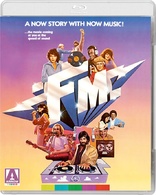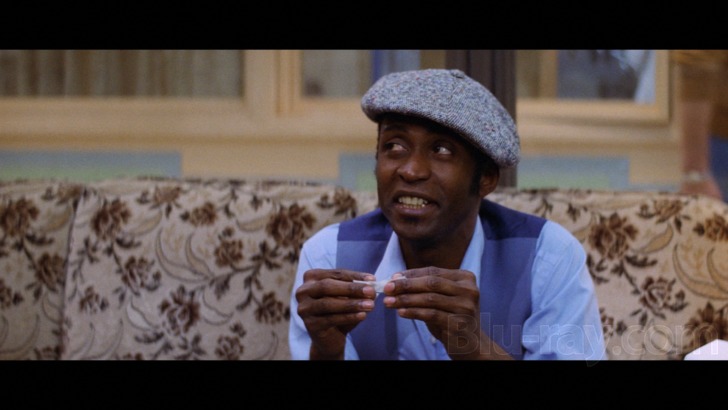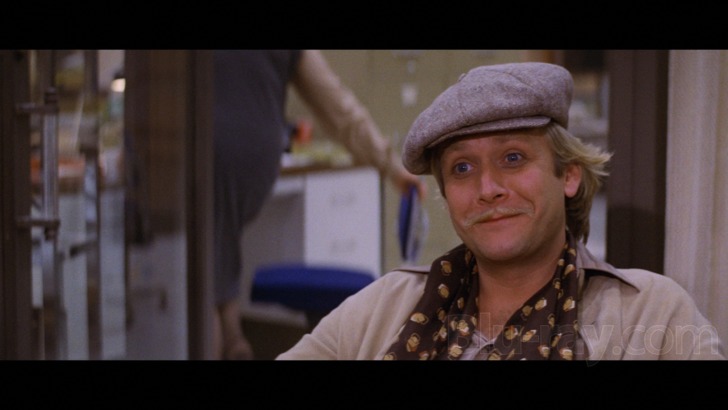FM Blu-ray Movie
HomeFM Blu-ray Movie 
Arrow | 1978 | 104 min | Rated PG | Jul 02, 2019
Movie rating
6.9 | / 10 |
Blu-ray rating
| Users | 0.0 | |
| Reviewer | 3.5 | |
| Overall | 3.5 |
Overview
FM (1978)
Q-SKY is the #1 radio station in Los Angeles mainly because of the music they play, and running the station the way they want to. It has led them to a ratings success. The interesting radio personalities include: Jeff Dugan, rebellious head of the radio station; Mother, who is burned out from being a DJ; Eric Swan, a self centered romantic who wants more than just being a DJ; The Prince of Darkness, the hip night DJ; and Laura Coe, the easy-going type. The movie focuses on the battle between Jeff and his corporate bosses, who want more advertising and less music.
Starring: Michael Brandon, Eileen Brennan, Alex Karras, Cleavon Little, Martin MullDirector: John A. Alonzo
| Music | Uncertain |
| Drama | Uncertain |
| Comedy | Uncertain |
Specifications
Video
Video codec: MPEG-4 AVC
Video resolution: 1080p
Aspect ratio: 2.35:1
Original aspect ratio: 2.35:1
Audio
English: LPCM 2.0 (48kHz, 24-bit)
English: DTS-HD Master Audio 5.1 (48kHz, 24-bit)
Subtitles
English SDH
Discs
Blu-ray Disc
Single disc (1 BD)
Playback
Region free
Review
Rating summary
| Movie | 3.0 | |
| Video | 4.0 | |
| Audio | 4.0 | |
| Extras | 2.5 | |
| Overall | 3.5 |
FM Blu-ray Movie Review
Well, maybe a *little* static.
Reviewed by Jeffrey Kauffman June 18, 2019“What’s radio?” On a supplement included on this release, Glenn Kenny gets to that somewhat hilarious question after a series of other giggle worthy queries which seek to illuminate the fact that, well, the times, they are a changin’, and “kids these days” may not have one stinking clue about either AM or FM. Of course in 1978, when FM first appeared, radio was the preferred method for hearing music in a “mobile” (or what passed for it in the “Dark Ages”) manner. FM was always kind of the “cooler” relative to the more mainstream AM formats, offering what Kenny details as Album Oriented Radio (I had always heard that the acronym AOR stood for Album Oriented Rock), with a supposedly more diverse playlist, though as Kenny gets into in his engaging overview of this era and its radio formats, “corporate” intrigue ultimately led to a homogenizing of even FM content. Kenny finds it interesting that FM doesn’t really get into that aspect of the business, despite the fact that it was already at least nascent by the mid 1970s, instead offering a kind of silly conflict that does posit corporate interference, though not really in terms of what kind of music could be broadcast to eager listeners in the Los Angeles market. FM is certainly a relic of its time in more ways than one, with a soundtrack that will no doubt create huge waves of nostalgia in Baby Boomers in particular, and an anti-military subplot that frankly feels kind of old fashioned for a 1970s opus (it might have been more at home in a film from the late sixties), as well as a few tangential moments (like one character leering at a woman’s posterior among other blatantly sexist behaviors) that may strike some as vestiges from a thankfully discarded past.

Was there some kind of “radio zeitgeist” in the air in 1978? FM evidently debuted in April of that year, and just a few months later, one of the best remembered sitcoms from that general timeframe, WKRP in Cincinnati, would begin it’s multi-year run. Unlike the hapless folks in the Ohio based comedy, though, the DJs of FM are all enjoying being on the top rated station in their market. Station manager Jeff Dugan (Michael Brandon) has assembled a grabbag of kind of outré talents for the on air talent, and he encourages the disc jockeys to play "hip" tunes (some of which will strike contemporary listeners as being decidedly mainstream), two things that end up giving the station Q-SKY* impressive ratings.
Those impressive ratings of course attract the attention of the bean counters in the company which owns the station, and they in turn want to translate huge listener numbers into ad revenue. That ends up involving the aforementioned subplot involving commercials for the Army, which in turn leads to a “revolt” of sorts on the part of the station’s on air employees. It’s kind of a weird plot dynamic for a film stemming from 1978, and some may wonder if some other kind of conflict may have been more “relevant” seeming for that era. The film also has some equally silly machinations surrounding a live concert sponsored by Q-SKY’s main competition, which Jeff schemes to broadcast live on his station. That at least allows for some supposedly “live” concert footage from the likes of Jimmy Buffett and Linda Rondstadt.
There’s therefore a patent unreality to much of the proceedings here, but the film does have a rather fun supporting cast, including Martin Mull in his feature debut as a leering chauvinist DJ. Cleavon Little is on hand as the overnight jock (one with more than a passing resemblance to WKRP in Cincinnatti’s “Venus Flytrap”), Eileen Brennan as the station’s putative (if occasionally caustic) mother figure (called Mother, in fact), Cassie Yates as a kind of token (younger) female employee, and a kind of sweet cameo by Norman Lloyd as the station owner. The film is never “believable” on several levels, but as fanciful as it may be, it does at least capture a bit of the “soundtrack” of the late seventies, and perhaps in a weird way documents the beginning of the end of the radio era. There are also a few fleeting views of Los Angeles circa 1978 which may appeal to some folks who either grew up or lived there during that time frame.
*Trivia fans will of course know that no radio station back in the day would have been allowed to have call letters beginning with a Q. As early as 1912, the federal government was “dividing” the United States into eastern and western sections (the boundary ultimately became the Mississippi River, evidently sometime in the 1920s), with stations east of the divide required to have call letters beginning with W (weirdly, since they’re east of the divide), and stations west of the divide required to have call letters beginning with K. This "branding" technique ultimately spilled over into television, too, of course. I did a live spot on Portland tv station KPDX years ago where they had just hired a new previously east coast based news anchor who mistakenly identified the station as WPDX on several occasions that day.
FM Blu-ray Movie, Video Quality 

FM is presented on Blu-ray courtesy of Arrow Video with an AVC encoded 1080p transfer in 2.35:1. Arrow's insert booklet contains only the following fairly generic verbiage about the transfer:
FM is presented in its original aspect ratio of 2.35:1 with 2.0 and 5.1 sound. The master was prepared in High Definition by Universal Pictures and delivered to Arrow Films.Universal's reputation with regard to its curating of its catalog transitioning into the high definition era has been steadily improving for the most part over the years, and this transfer is another generally nice example from the studio that maintains a healthy appearance. While arguably a little on the coarse side at times, there's an overall naturally resolving grainfield. The palette looks nicely fresh throughout most of this presentation (there are a few variances in densities), and detail levels are generally very pleasing. The "live" concert footage is a tad softer at times than the bulk of the presentation, which admittedly is not "razor sharp", but maintains an appropriate era specific look. Some minor signs of age related wear and tear can be spotted, mostly in the form of smaller specks and flecks. There's a bit of yellow chunkiness to the look of the grain in understandable moments like the optically printed credits sequence or a later quasi-montage with a series of optical dissolves, but on the whole this is a very commendable looking release which I think will easily satsify fans.
FM Blu-ray Movie, Audio Quality 

FM features either LPCM 2.0 or DTS-HD Master Audio 5.1 tracks (the disc is authored to default to the stereo track). Both tracks provide sterling fidelity and a rather nice accounting of source cues used throughout the film (along with Steely Dan's original theme), but the surround track is noticeably beefier in both midrange and (especially) lower frequencies. Dialogue and effects are all rendered cleanly and clearly, and there are no signs of any age related wear and tear whatsoever.
FM Blu-ray Movie, Special Features and Extras 

- No Static at All (1080p; 25:05) is an engaging newly filmed interview with star Michael Brandon. He has a number of fun anecdotes, including the kind of interesting fact that he evidently came up with the basic premise for Starman, which was initially set to air as a two part episode of his then wife Lindsay Wagner's series The Bionic Woman. A Wiki fan site devoted to the series has this page devoted to the production. Kind of amazingly, Brandon went on to a significant voice work career in Thomas & Friends.
- Radio Chaos (1080p; 23:24) is a newly done interview with screenwriter Ezra Sacks, who discusses his firsthand knowledge of the radio business.
- The Spirit of Radio (1080p; 23:00) is a fun piece with critic and writer Glenn Kenny, who discusses both this era's music and radio formats in general, and some of the tunes on this film's soundtrack in particular.
- Isolated Music and Effects Track is presented in Dolby Digital 2.0, which may disappoint some ardent audiophiles.
- Original Trailer (1080p; 2:53)
- Image Galleries
- Production Stills (1080p; 10:00)
- Posters, Lobby Cards and Press (1080p; 2:40)
- Soundtrack Editions (1080p; 7:30)
FM Blu-ray Movie, Overall Score and Recommendation 

My wife had a long career as a news anchor at several major market AM/FM consortiums over the years and she and many of her co-workers have some really fantastic anecdotes, some of which are frankly at least as funny if not more so than anything in FM or even the more blatantly comic WKRP in Cincinnatti. My favorite story of hers stems from her days at a large Chicago station that was so big it had a news writing staff (at many other stations, my wife wrote her own copy). On the evening of the Jerry Lewis Telethon one year, she got handed copy with a horrifying but hilarious typo that thankfully did not go out over air which read, "Jerry closed the show with a moving rendition of 'You'll Never Walk Again'." If Art imitates Life, FM arguably could have benefited from more of that kind of unexpected humor rather than some of the even in 1978 dated feeling subplot of what amount to student activists standing up to the military-industrial (or at least radio industry) complex. A really appealing cast helps to make up for some of the story deficits, but even diehard Martin Mull fans may be momentarily horrified by some of the behaviors his character displays. Technical merits are generally solid, and the supplementary package very enjoyable. Recommended.
Similar titles
Similar titles you might also like

Stunt Rock
1979

The Decline of Western Civilization
1981

Blacula
1972

Scarecrow In a Garden of Cucumbers
1972

Tuff Turf
1985

Elvis
1979

Car Wash
1976

Private Parts
1972

Alice in Acidland
1969

Heavy Trip
2018

Foxes
1980

Rockers 4K
1978

Dinner in America
2020

Rifftrax Live!: Reefer Madness
San Diego 2010
2010

Beyond the Valley of the Dolls
1970

Ladies and Gentlemen, The Fabulous Stains 4K
Limited Deluxe Edition | on retailer site
1982

The Mad Bomber
The Police Connection
1973

Wild Guitar
1962

Catfight
2016

Donnybrook
2018